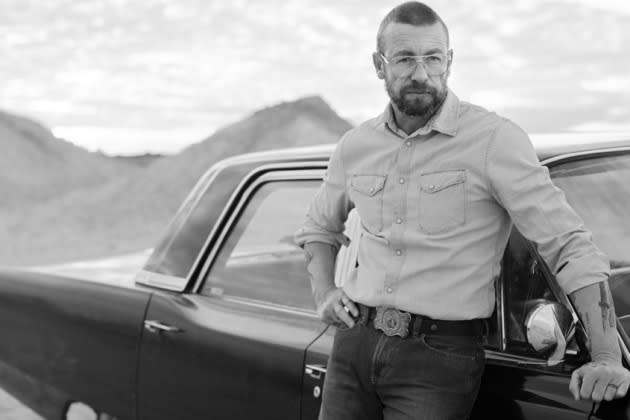Berlin Review: Simon Baker In ‘Limbo’
- Oops!Something went wrong.Please try again later.

Odd people turn up in deserts. People are also inclined to disappear. A strange moonscape of opal prospectors’ digs and slurry heaps helps to set a bleak mood in Australian filmmaker Ivan Sen’s Limbo, shot in gently faded black and white in the South Australian mining town of Coober Pedy, repurposed here as Limbo. Limbo, says the preacher whose radio show seems to be the only thing available on the local airwaves, is the edge of hell. Here, unpurged sinners may be “in friendship with God.” Damnation, however, isn’t far away.
Visiting detective Travis (Simon Baker) doesn’t seem to be in friendship with anyone. Baker, an Australian actor familiar as a suave presence in The Mentalist and other U.S. series, carries himself here as if he had spent his entire life facing a dusty headwind; he sinks into the role to become unrecognizable. When Travis checks into Limbo Hotel – which, like a designer version of the miners’ dwellings, is a series of stony underground caves – he really is at the end of Lonely Street. No surprise when he pulls out his working kit: spoon, burner and syringe. Travis presents as a hard man, but something in him must be aching.
More from Deadline
He’s here to review a 20-year-old cold case of a little indigenous girl’s disappearance. Police showed no interest in the case at the time until it was too late; they tried and narrowly failed to pin it on one of their usual Black suspects – the girl’s brother Charlie (Rob Collins), who lives in a caravan on the wasteland of slurry heaps – while local suspicion fell on Leon, a white prospector who was known to “like young Black girls.”
RELATED: Deadline’s Berlin Film Festival Coverage
Travis’ job is to decide whether there is any mileage in reopening the inquiry. Leon is said to be dead, but he visits his old dugout anyway. According to his brother Joseph (Nicholas Hope) – a twitchy misfit whose accent could come from anywhere – Leon died of dementia in a chair where he now sits; there is a makeshift grave nearby. Did he? Is there a body in that grave? Who would know, one way or the other, out here? It’s not a question he will get to answer – not conclusively, anyway.
Sen frames his sparsely written story within familiar genre markers. We all recognize the outsider cop coming to a small town, meeting a series of witnesses reluctant to talk to him or anyone else. There is that hostile landscape, a variation on Death Valley; there is even a twist on the film-noir classic of the weary woman, past her best, who will set her cap at the newcomer.
Emma (Natasha Wanganeen) is Charlie’s sister; she slogs away at the local café to support her own and Charlie’s children. Maybe this white cop could be the man she needs; her daughter tells him that her mother has had a lot of boyfriends. More than that, we can piece together ourselves; we never hear anyone’s whole story, but Sen conveys the texture of these hardscrabble outback lives through small details and a few telling words here and there. “I don’t talk to police, especially white ones,” says Charlie to Travis. It is a simple sentence that freights a huge weight of history.
What Sen doesn’t do is present a crime, investigate it and wrap it up with a solution. The original crime is more of a setting, like the landscape, the strange town of Limbo or the insistent Bible-bashing voice on the radio: it hangs over the survivors like another cloud of dust. Anyone expecting a conventional police procedural – and there is every reason to expect that, given the set-up – may well be irritated by the fact that Travis’ encounters with the people involved so long ago yield very little information and no ultimate solution.
The substance of the film lies elsewhere, in the fact of these people’s existence and the things Sen makes us notice. Look at this single streetlight on a desert highway. Gasp at the sheer breadth of the mining field seen from the air. This is a film that will be valued for its sheer singularity – not by everyone, certainly, but by anyone curious about what the edge of hell might be like.
Best of Deadline
Sign up for Deadline's Newsletter. For the latest news, follow us on Facebook, Twitter, and Instagram.

